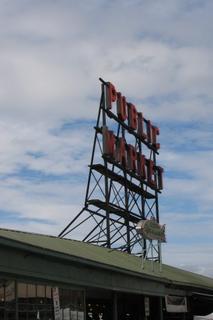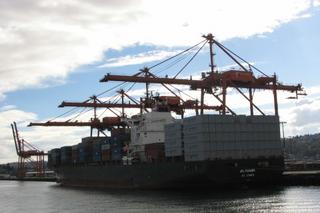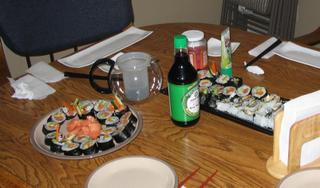
On our last day in Seattle, we headed downtown. We started at Pioneer Square, which wasn't too crowded when we arrived around 11 in the morning. We stopped off at the Seattle unit of the Klondike Gold Rush historical center. The Alaska Gold Rush seems like it was an incredibly futile adventure, even in comparison to other gold rushes. It cost the men about $3000 a head (in 1890's money) to make the long and dangerous trek up to Alaska. By the time they arrived, most of the gold had already been claimed. The gold rush was instrumental in the development of the city of Seattle, however. By outfitting the prospectors and cashing out the lucky few who stuck it rich, Seattle began its transformation to the commercial capitol of the Pacific Northwest during the great Alaska gold rush.
After Pioneer Square, we headed over to Pike's Market. We grabbed some lunch and some coffee at the world's first Starbucks. While I was waiting for my coffee, I wondered if anyone in Seattle has ever boycotted Starbucks under the guise of supporting local coffee shops. I also contemplated the concept of the urban market. Pike's Market probably the second most famous tourist attraction in Seattle. Almost every city in the world has some kind of outdoor food market, but only certain ones have become tourist attractions. Why are some outdoor markets famous the world over and others unknown even to most of the inhabitants of the city in which they are located? The world may never know. When you think about it, a food market is a pretty weird tourist attraction. Who buys fresh produce, fish, and meat when they are on vacation? All of these markets sell enough souveniers, packaged foods, and meals that tourists can find plenty of things to spend their money on. I love visiting markets when I travel, and I even get a kick out of visiting grocery stores when I'm away from home, especially in foreign countries. The strange thing is I never go to the market when I'm at home. I've never lived in a town with a market as famous as the one in Seattle, but I've rarely visited the markets in any of the places where I've lived. Case in point, the Syracuse downtown farmer's market is only a couple of blocks from my office, yet I have never paid it a visit.

We went down to the waterfront after lunch and took a cruise around Elliot Bay. The cruise didn't offer any spectatular views of the bay, but it was very informitive. We cruised over by the port and got to watch a freighter getting processed. The tour guide gave us a quick overview of intermodal shipping, which isn't the kind of thing you usually hear about when you're on vacation, but I found it very interesting, seeing as I'm something of a transportation and shipping geek. As a geek, I was already aware that Seattle is closer to east Asia than any other port city in the continental US, but the tour guide was kind enough to mention it for the rest of the passengers.

After the cruise, we headed back to the market to pick up some salmon. We didn't get to see them throw any fish while we were there, but it was pretty neat to watch them fillet the fish that we bought in about 30 seconds. We took the fish back home and made some delicious sushi and sashimi out of it, which we enjoyed for dinner that night.

On Monday morning, our hosts were kind enough to drop us off at the airport before heading to work. We finally caught a glimpse of Mt. Rainer on the way to the airport. Even with at least half of the peak obscured by clouds, it still looked breathtaking. When we checked in for our flight, the gate agent asked if we would be willing to take a later flight home via Atlanta in exchange for two $400 vouchers since our flight was potentially oversold. This would've meant getting home after midnight instead of 9pm, but for $800, how could we refuse? Having never been in a position to accept denied boarding compensation, I was fairly excited, but in the end, the oversell didn't materialize and we went out on our originally scheduled flight.

No comments:
Post a Comment